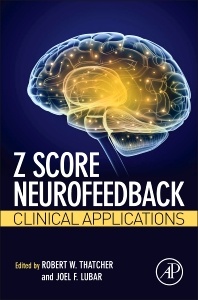Description
Z Score Neurofeedback
Clinical Applications
Coordinators: Thatcher Robert W., Lubar Joel F.
Language: English
Subjects for Z Score Neurofeedback:
Keywords
19-Channel Z-score neurofeedback; ADHD; Alcohol use disorder (AUD); Anxiety; Attention; Brain networks; Brainsurfer; Brain-computer interface (BCI); Ceretec; Cogmed; Cognitive enhancement; College students; Current density; DLPFC; DTI; Depression; EEG; EEG biofeedback; Epilepsy; Executive functioning; Headaches; Heart rate variability; LNFB; LORETA; LORETA Z scores; LORETA Z-score neurofeedback; LORETA Z-scores; LORETA biofeedback; LORETA neurofeedback; Laplacian montage; Learning disorders; Linking symptoms; Low-resolution electromagnetic tomography; MRI; MTBI; Memory; Mental stamina; Mood disorder; Neurofeedback; Neuropathy; Operant conditioning; PTSD; Pain management; QEEG; Quantitative electroencephalogram (qEEG); Quotient ADHD System; Real-time Z score biofeedback; SPECT; Seizures; Slow wave activity; Sluggish cognitive tempo; Symptom checklist; Training methodology; Transcranial direct current stimulation; Working memory; Z scores; Z-score; Z-score LORETA; Z-score NFB; Z-score neurofeedback; Z-scored FFT
404 p. · 15x22.8 cm · Hardback
Description
/li>Contents
/li>Biography
/li>Comment
/li>
Neurofeedback is utilized by over 10,000 clinicians worldwide with new techniques and uses being found regularly. Z Score Neurofeedback is a new technique using a normative database to identify and target a specific individual?s area of dysregulation allowing for faster and more effective treatment. The book describes how to perform z Score Neurofeedback, as well as research indicating its effectiveness for a variety of disorders including pain, depression, anxiety, substance abuse, PTSD, ADHD, TBI, headache, frontal lobe disorders, or for cognitive enhancement. Suitable for clinicians as well as researchers this book is a one stop shop for those looking to understand and use this new technique.
Preface
Chapter 1 - History and Technical Foundations of Z Score EEG Biofeedback Robert W. Thatcher, Carl J. Biver, and Duane M. North
Chapter 2 - Network Connectivity and LORETA Z Score Biofeedback Robert W. Thatcher, Carl J. Biver, and Duane M. North
Chapter 3 - Optimal Procedures in Z Score Neurofeedback: Strategies for Maximizing Learning for Surface and LORETA Neurofeedback Joel F. Lubar
Chapter 4 - Surface and LORETA Neurofeedback in the Treatment of Post-Traumatic Stress Disorder and Mild Traumatic Brain Injury Dale S. Foster and Robert W. Thatcher
Chapter 5 - Z-score LORETA Neurofeedback as a Potential Therapy in Depression/Anxiety and Cognitive Dysfunction J. Lucas Koberda
Chapter 6 - LORETA Z-Score Neurofeedback in Chronic Pain and Headaches J. Lucas Koberda
Chapter 7 - Treating Executive Functioning Disorders Using LORETA Z-Scored EEG Biofeedback William A. Lambos and Rebecca A. Williams
Chapter 8 - Combining LORETA Z Score Neurofeedback with Heart Rate Variability Training Michael Thompson, Lynda Thompson, and Andrea Reid-Chung
Chapter 9 - Treating Anxiety Disorders Using Z-scored EEG Neurofeedback William A. Lambos, and Rebecca A. Williams
Chapter 10 - Therapy of Seizures and Epilepsy with Z-Score LORETA Neurofeedback J. Lucas Koberda
Chapter 11 - LORETA Neurofeedback in Alcohol Use Disorders: A Case Study Wesley Center
Chapter 12 - LORETA and SPECT Scans: A Correlational Case Series Paul Wand and Gerald Gluck
Chapter 13 - Brainsurfer and Brain Computer Interface Z-Score Biofeedback Robert W. Thatcher, Carl J. Biver, and Duane M. North
Chapter 14 - LORETA Neurofeedback in College Students with ADHD Scott L. Decker, Alycia M.Roberts, and Jessica J. Green
Chapter 15 - 19-Channel Z-Score Training for Learning Disorders and Executive Functioning Rachael M. Little, Brianna H. Bendixsen, and Richard D. Abbey
Dr. Thatcher received a Ph.D. in psychology with a major in biopsychology from the University of Waterloo in 1970 and a B.S. in Chemistry from the University of Oregon, 1966. He completed postdoctoral fellowships in neurobiology and neurophysiology at the Albert Einstein College of Medicine in 1971-72 before joining the faculty of New York Medical College.
From 1993 to 2001 Dr. Thatcher was also the EEG and MRI principal investigator for the Department of Defense and Veterans Administration Head Injury Program (DVHIP).He joined the National Institutes of Health in 1991 as the program manager for the integration of 128 channel EEG with MRI and PET. Prior to this, he was professor of psychiatry and director of the QEEG service at Shock Trauma, University of Maryland. He was also an associate professor in the Department of Psychiatry at New York University School of Medicine from 1977 to 1979. Prior to moving to NYU he was an assistant professor, Department of Psychiatry and Physiology, New York Medical College 1973-1977.
From 1993-2006 Dr. Thatcher was the director of the NeuroImaging Laboratory at the Bay Pines VA Medical Center, Bay Pines, Florida, and was an adjunct professor in the Department of Neurology at the University of South Florida. He also has served on the National Institutes of Health Scientific Advisory Committee for the NIH Human Brain Map Project.
Dr. Thatcher's professional affiliations include being on the medical advisory board of Brainscope, Inc and a board member of the American Board of Electroencephalography and Clinical Neurophysiology, a National Institute of Health Scientific advisory board member and an executive board member of the EEG and Clinical Neuroscience Society. He is involved in collaborative research with several major medical centers as well ongoing clinical applications of qEEG and EEG biofeedback as part of the Resilience Program of the US Army at Fort Campbell. He has been the recipient of the Hans Berg
- Contains protocols to implement Z score neurofeedback
- Reviews research on disorders for which this is effective treatment
- Describes advanced techniques and applications




